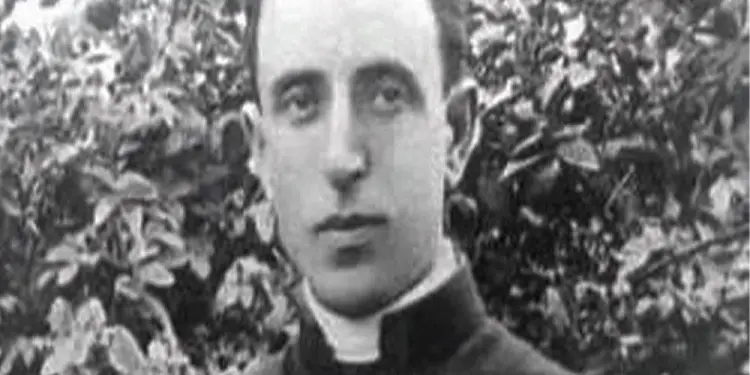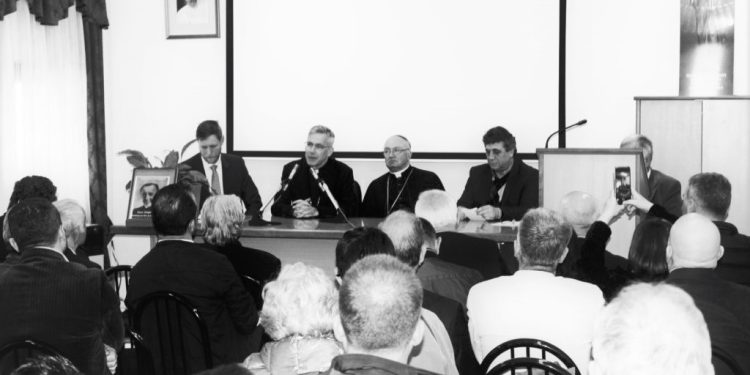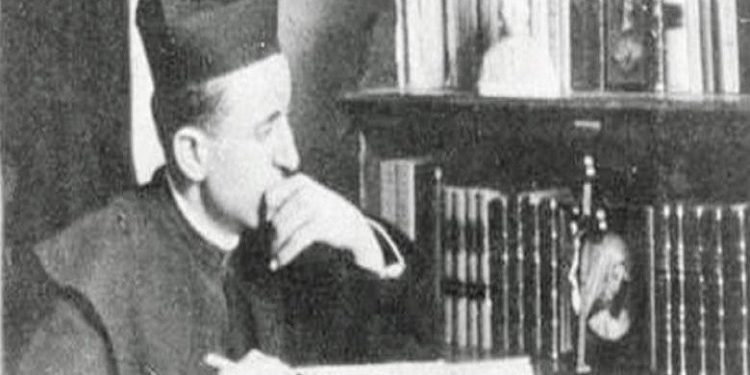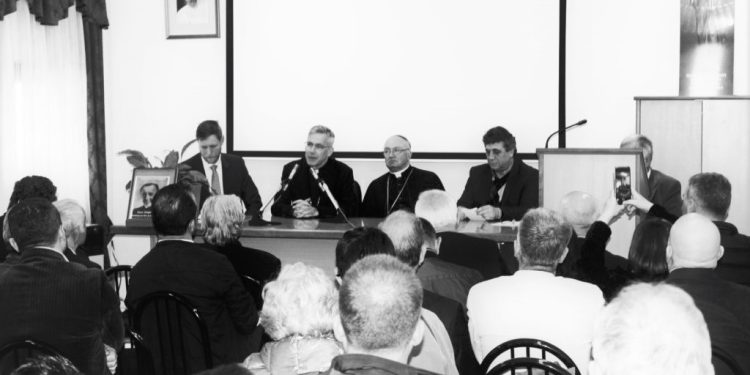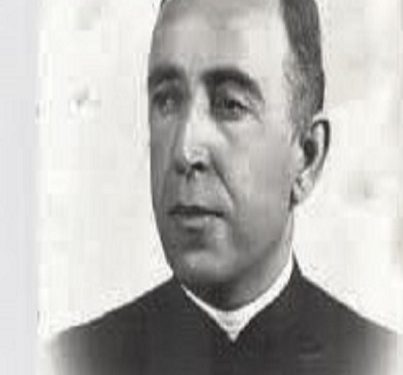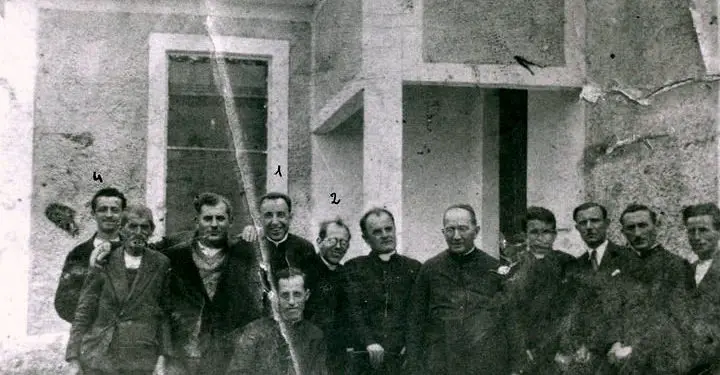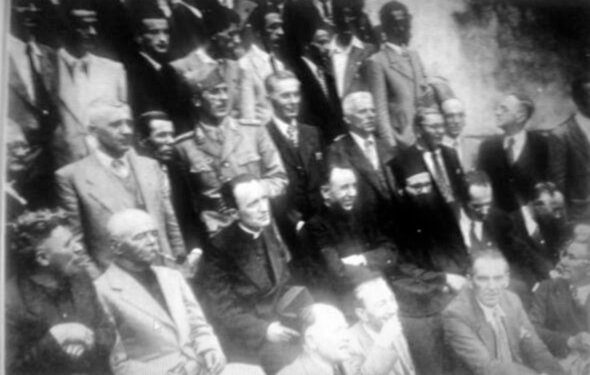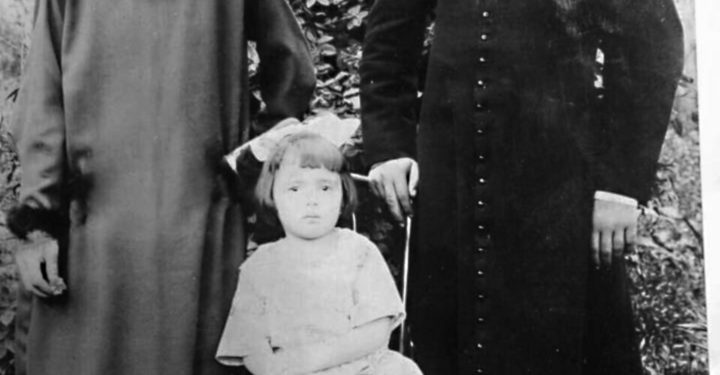NIKOLLE LOKA
Av. ALFRED DUKA
NIKOLIN KURTI
Part thirty six
– THE FORECAST MURDER OF A CLERGYMAN OF THE RENAISSANCE –
Memorie.al / Before we begin to briefly analyze the investigative and judicial file in charge of the defendant Shtjefën Kurti and others, for the reader we will make a parenthesis of the right and its history in human society, with the goal of coming to our criminal and procedural law, from its beginnings and throughout the years of the dictatorship.
Statements of former prosecutors and judges who sentenced Dom Shtjefën Kurti to death
Statement of Jani Vasili, member of the Criminal Panel of the Supreme Court that judged Shtjefa Kurti
At the request of Mr…., I declare that the decision of the District Court of Kruja with No. 54 dated 31.7.1971, with which, among other things, Shtjefën Kurti was sentenced to death for the so-called crime of sabotage, as well as the decision of the Criminal Panel of the Supreme Court, in which I also participated, are completely unjust. In both of the above decisions, the death sentence of the convicted Shtjefën Kurti for the crime of sabotage was accepted without any legal basis.
In both justifications of the decisions, it is clearly proven that the activity accepted by the Court in charge of the above clearly results that it has nothing in common with sabotage, but is the deliberate, very extended interpretation of the communist dictatorship, to eliminate social and religious activity, like the convicted Shtjefën Kurti.
It is more than clear that in this decision everything was prejudged and decided by the communist dictatorship. I expressed and express my deep regret to the family, for this great spiritual burden, also for my inability to openly express my conviction at that time, my conviction for the truth in that decision.
April-May 2012
Attitudes like this, of one of the judges of the Supreme Court of the former People’s Republic of Albania, from the sixties and seventies, are unusual. Dictatorships, in whatever form they become the destiny of a people, or the peoples they rule, are monstrous oppressive machines, but communist dictatorships, in contrast to others, with the stripping of every form of private property, together with every form of freedom, both of these components sanctioned by the Constitution of 1976, result in individuals, small instruments, who become part of the great oppressive machine itself, which comes to be increased day by day and becomes an oppressor of others, up to the last individual of society. The dictator, this monster of a machine, periodically replaced its parts, until the prime minister at the end of 1981, and so on until he died and then his monstrous machine.
Like the entire superstructure of the dictatorship, even the judges were its tools, they were blinder than the others, like in an animal farm. They judged only ordinary crimes, for others they only carried out the order of the party, as its obedient soldiers, violating every principle that this profession required. This was the bargain made between them and the dictatorship. It was not even thought that it could be done otherwise, since the displacement was not more than three or four meters, from the stand to the bank, or, in other words, from the black toga to the brown suit and shaved head. Thats it. Even retreating was almost impossible. He tried it in the early fifties, the Minister of Justice of that time and escaped punishment, only thanks to his ethnic origin, because otherwise he would have been slaughtered.
Bolshevik dictatorships are like those metal trenches, which have as technical difficulties, only the fastening of a corner of sheet metal, then they themselves know what to do with it. Anyone who lived through that time, it is not easy to accuse individuals, even from the justice system of the dictatorship, except for those convicted of conscience, since others, from all walks of life, have been there. And if at that time only if they stuttered against her publicly, they have all the right of God to scream at them today, others are less fortunate aesthetically in this action. We all hoped that, since in our country an effective legal mechanism was not established against the crimes of communism and, so to speak, great power was given to the propaganda slogan
“All co-sufferers and all complicit”. Naturally, a Mea Culpa was expected from many individuals who had served the dictatorship, but this thing, not only did not happen, but after a first attempt, a counter-offensive followed with the motto: “We have punished you in vain, but we have punished you with the law!” Self-justification! However, it is known that dictatorships do not operate with laws, but with a system of internal rules, to which they give a priori legal form, since in order to enjoy the attributes of the law, the legal norm, it is required to be internationally recognized as such, otherwise, there remains only an internal rule that is sold as law. This is how the apology for the crimes of communism came to life, followed by a disciplinary alignment of all the actors of the dictatorship, from Ramiz Alia, to the last communist of the last village. We thought that there will be personalities and individuals who are servants of the dictatorship, who will reflect in one form or another, but only Agolli would do this, and not honestly, as he consumed it in a party activity.
At this point, communists, Nazis and fascists are like two drops of water. Thus, the statement of the former judge of the Supreme Court during the dictatorship, Jani Vasili, attracts attention as an atypical attitude of the officials of that time. Why? Because pity is a virtue of man, one of the distinguishable from animals. No one, no one has asked why he wasn’t a hero then, but everyone expects an inspiring, honest apology, which seems to restore justice, correcting injustice, despite the fact that none of the consequences are ever repaired. The feeling is divine, its acceptance an obligation. No one can revive Eng. Nikolin Kurti, his uncle, shot at the age of seventy-three, with an absurd decision by the court of that time, but the Mea Culpa of Jani Vasili, even though the signatory of the death sentence without guilt, forces the victim’s successor to sincerely accept that apology
Feeling or the apology of the crime!
“I have felt and feel it as a constant obligation to express my apologies to all those people who, in all that happened in Albania, lost their dearest people”.
Can a letter be addressed to the nephew of the one who requested the death penalty; forty years ago for a crime not based on the law, not even in that practice of the plenary sessions of the Supreme Court that seeks to convince the recipient of the letter? By law, Dom Shtjefën Kurti could not be punished even for the criminal offense of agitation and propaganda, since that provision necessarily required that agitation and propaganda be considered consumed only when it was carried out in the form of a call, which we have clearly analyzed above. In which case did Dom Shtjefën Kurti call? In no case. Such a call is not found in the file of several volumes. How can you not get the courage to apologize to the victim’s grandson, for all those tam tam vomits on that pretence!?
“By reading, within two days, one of the books you gave me, I was able to really get to know the outstanding figure of Dom Shtjefni, as a patriot, patriot, personality and indomitable fighter for the national issue, for education and the language of our country. I congratulate you for the commendable work you have done to recognize and perpetuate the figure of this martyr”.
Dom Shtjefen Kurti explained his life in detail before the investigation, together with his patriotic activity, the explanation of which is in the complete file. It is assumed that the file has been read and sung well by a prosecutor who maintains the claim, and what a claim! By death, by shooting!
“At the end of the investigations, with the indictment of the Directorate of Investigation of the Ministry of the Interior, the case is sent to the Krujë District Court for jurisdiction. The custom trial took place for several days in the village of Gurëz, in the former church of the area, which was converted into a cultural center”.
The ex-prosecutor should have been told by someone that that Church, transformed into a center of culture, was built by the very person who requested his shooting forty years ago?!
“The defendants have answered the questions directed by the court, have given explanations and clarifications about the charges, have defended themselves (because the lawyer did not work at that time) and, as far as I can remember, have accepted their guilt and that of the members of the group”.
The ex-Prosecutor scoffs. He pretends he doesn’t know how the charge was accepted in those years. But how can their guilt and that of the members of the group be accepted!!! Mr. Prosecutor did not explain this to us. Guilt is an individual act, it is accepted or not for oneself, it is not accepted for others, even when they are jointly accused. To learn this, it is not necessary to be a prosecutor, nor a judge of the Constitutional Court.
“I remember that during the trial in the village of Gurëz, which lasted 5-6 days, the representative of the General Prosecutor’s Office Mr. Zaim Myftari was present, who performed the duties of the Prosecutor at the Supreme Court. Similarly, I remember that the trial was attended by Mr. Vahid Lama and a friend of his, whose name I do not know, who were doing physical work in that area on those days, both employees of the Central Committee Apparatus.”
It could have been said that we were under pressure and I was ordered. No one would ask you to be the hero then! It would be much more honest than that, to count the practice of the plenary sessions of the Supreme Court, as at the end of this letter.
“The punishment given in the case of the Gurezi group could not be unaffected by the Party’s interests and propaganda. I remember that, also in these case, different forms and methods were used, of which I am mentioning:
Political and ideological processing on the judiciary and others. After the Ministry of the Interior completed the investigations, it informed the Central Committee of the Party about their results.”
Agree on the judging panel. Was political and ideological manipulation used on you? Say it!
“Shortly before the trial, a bulletin was published by the Central Committee, which was distributed throughout the country and we also got to know about it. In this bulletin, which contained the Party’s conclusions, the analysis of the group’s activity was made that was encouraged and inspired by the enemy to sabotage the economy and the cooperative system in Albania. The group, especially the late Dom Shtjefën Kurti, was considered quite dangerous, etc. This method did not differ at all from those used before or after, for the so-called hostile activities in the economy, in the army, in art and culture, in oil, etc., where the analysis, conclusions, responsibilities and even legal epithets were made by the Party, before the investigation and trials”.
Who better than you knew how dangerous Dom Shtjefen Kurti was? The party?
“Of course, the fact that he had been sentenced to 20-25 years in prison, being considered as an incorrigible opponent and spiritual inspirer of the whole group, also influenced the sentence of Dom Shtjefën Kurti”.
As the accused themselves admitted, after contact with him, the thefts in this cooperative intensified more in cases, in quantity and in the implications of people, accompanied by anti-party propaganda. We have clearly analyzed this moment that the Prosecutor wants to explain.
As a reminder, it is stated in the claim that 1970 was a year of abundant production and high results for the Gurezi cooperative. While the Priest was arrested on 6.06.1970 and Agustin Preçi in September of the same year.
“All persons, members of this group, were accused of the same criminal acts, according to the Criminal Code in force, as well as the District Court and the Supreme Court accepted these accusations as legal rights, despite the fact that not all members had the same role in this act. Almost all of them were in the role of executor, because they committed the thefts in the warehouse, in the warehouse, in the sheds, also obtaining material benefits, while Dom Shtjefën Kurti was accused as an auxiliary person. in the role of instigator”.
And capital punishment was requested for the helper, while for the executor’s prison sentences!!!
“According to Article 26 of the Criminal Code, accomplices for the commission of the criminal offense are called: Organizers, executors, oppressors and helpers, who are responsible, as well as the executors for the criminal offense committed. In determining the punishment for the accomplices, the degree of participation and the role of each in the commission of the criminal offense is taken into account. Even if the offense was classified as theft in large proportions, the punishment according to the Criminal Code of the time (Article 80 Criminal Code) was no less than 7 years of imprisonment until death”.
As to why the transition from theft to sabotage was made, we explained it in detail and based on the laws of the time, together with the practice of the Supreme Court. According to Article 80 of the Criminal Code, therefore, with the charge of theft, there was no form or way for Dom Shtjefën Kurti to be punished by firing squad! Even if his role as an instigator, i.e. assistant, was accepted, he could never be sentenced to be shot, only if they were all shot.
“The Supreme Court, in its judicial practice, had accepted that the misuse and appropriation of property in large proportions, accompanied by agitation and propaganda, was considered as economic sabotage. Since 1955, there are examples of decisions of the Supreme Court, published in the magazine “Drejtësia” and in the bulletin of the Supreme Court, until in 1973-1974 the Instruction of the Plenum of the Supreme Court “On crime et v. state’, which once again confirmed this practice of several years of the Supreme Court. Even in the legal literature or in the lectures and teaching practices, the same attitude was maintained”.
Dom Shtjefen Kurti’s sentence was based on the Criminal Code of 1959, which was in force in 1971. The practice of the Supreme Court was a guiding practice and not at all binding for the ordinary courts, of course also for the prosecutions. So this moment is confusing and devious! From the year 1973-1974, when the instruction of the Plenum of the Supreme Court “On crimes against the state” came out, yes, from this moment onwards the practice of crimes against the state became mandatory, as the time came to sentence the members of the Political Bureau to death, without the law, but not with the unifying practice of the Supreme Court that the Prosecutor is worried about!
Another moment that should be given due importance and which is quite easily overlooked by the Prosecutor, is the fact why so much pressure was exerted at that time, with all the forms and ways explained, which are the truths reflected in the file, while the death penalty, by firing squad, was based on the law and the evidence administered in the file! Why? So we come to the logical conclusion, either Dom Shtjefën Kurti was convicted based on the law and the evidence, or he was convicted under the pressure of the Party! One or the other. If the Party was sure that the shooting of the Priest was justified, there was no reason why Comrade Enver would take his secretary with “physical work” to Gurëz, in that exhausting place!
“I don’t make this legal clarification as an excuse, but I want to say sincerely that this has been my belief and that I have never consciously and premeditatedly accepted, or would not agree with deliberate distortions of the law. I have worked for nearly 50 years, I may have made mistakes, I never exclude this, but in my soul I have tried to be pure.
I have made mistakes; I may even have made mistakes”!
The fact that the letter writer is no longer alive does not oblige me in relation to the text and spirit of this letter, which, anyway, we cannot but mention that it lacks a single word, the most necessary of all the words that human society has created since its creation – Forgiveness – Feeling!
If I were in the place of Nikolin Kurti, I would have forgiven the Pretense maintained in the judicial process, as much as it could be called such, but the letter with that content, never. It is an unbecoming twist for a man of that age, for a very good connoisseur of the law of that time. From an ethical point of view, you don’t apologize (regret) to the people for a crime or crimes that you yourself have committed, but to the one to whom you addressed that letter! Manhood and nobility is a state you either have or you don’t. He was not treated as an “accused” in that case, as Nikolin Kurti invited him in a friendly manner to express his opinion about what happened 40 years ago. The ex-prosecutor has responded stealthily, without manliness, once again accusing the shot Dom Shtjefën Kurti! Even refusing to approach that time would be more dignified than trying to legalize that criminal claim. Memorie.al




